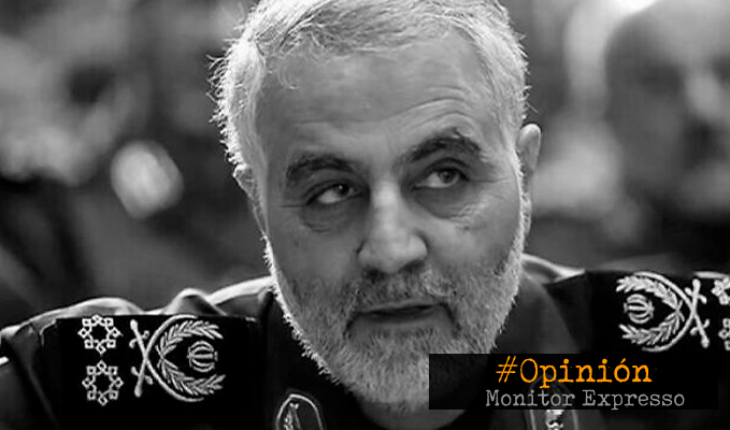The case of “cleansing” operations in which the U.S. extra-judicially executes death sentences on individuals declaring enemies of U.S. national security places various ethical-legal problems.
The execution of Soleimani, Iran’s top security and intelligence commander, in early Friday morning, in a drone strike at Baghdad International Airport was authorized by President Trump, in a escalation of the direct confrontation between the White House and Tehran. That is, it is an act of war for “remote control” based on the “preventive” doctrine established as a reaction to the attack on the twin towers, as stated from the Bush administration.
In addition, the extra-judicial execution of Quassem’s “selective assassination” is a transition (or better, a leap) from a “by proxy” war to a direct declaration of war between the United States and Iran, without the Trump administration having gone through an authorization from the Union Congress.
But, it is not this debate about the (in) constitutionality of the act ordered by Trump, which is at the center of this brief opinion column.
What worries me and apparently also worries the Pentagon, but not the group of sykofantes surrounding Trump in the White House, is the legality of “selective killings” from the point of view of international law.
The terminology of the communiqué published, tonight of January 2, 2020, by the Pentagon is not innocuous, but built with extreme care to define the legal architecture of the use of force to eliminate an Iranian general in Iraqi territory, conducted by the United States, on the basis of a direct order of the executive branch. Indeed, Baghdad’s operation against Soleimani, and its elimination/execution, reopens the debate on issues of the legal and ethical field, which have, so far, been scarcely worked, either by the academy or by international bodies, concerning the law of war.
The first question, in the field of the Ius Ad Bellum, is about the legitimacy of acts of war in the territories of countries with which there is no prior declaration of war or which are even allies and legality, under the principles of international law of what has euphemistically been called as “selective deaths” or “selective killings”.
In this sense, the first author to reread is S. L. Carter, jurist and holder of the Chair of Law “William Nelson Cromwell”, at Yale University, who a couple of years ago published an article that seems to me worthy of quoting (and recommending, what I actually did in a 2013 article), called “What’s wrong with Awlaki’s killing” (1). Carter places two questions of the legal and ethical sphere, the first being the problem, above, of the legitimacy, in the field of the Ius Ad bellum of acts of war in territories of countries with which there is no declaration of war, as is the case of operations in Pakistan, in Syria, in Iraq, etc. and legality, under the principles of international law of what has been euphemistically called, as “selective deaths” or “selective killings”.
Stephen L. Carter and many other jurists (including myself) are extraordinarily skeptical of the arguments put forward, for example by the Bush and Obama administrations (the Trump administration, don’t even care about creating that argument) to justify the use of selective executions, in the sense that these acts are contrary to the international principles of the law of war, as well as creating a context that fosters reciprocity: “What about reciprocity? Under both the law and the ethics governing armed conflicts, willow for the goose is willow for the gander. If a tool of warfare is acceptable for one side, then it is acceptable for the other—even if only one of the two sides is fighting in a just cause.”
The second issue is placed in the field of human rights, since what we are seeing are extra-judicial executions, of individuals who, although guilty or allegedly guilty of heinous acts, have not been tried in accordance with law.
Another author to read, who gives us the other side of the argument, is Gary Solis, (2), Professor of Law at Georgetown University, who in his 2010 book “The Law on Armed Conflict: International Humanitarian Law in War”, states, “Selective murders and murders (selective deaths) are very different acts.”
I, I am not so sure if they are “very different” acts, in fact I am very skeptical to this type of foundation that seems to me to be a “pun” that justifies, ideologically, an act of war that can be, and that is the problem, in the limitof the legal. I mean, we’re on a thin red line between the lawful and the illicit in the Ius in beautiful. Opinion that appears to be shared with Judge Abraham Sofer, (3) former U.S. District Court federal judge for the Southern District of New York, on the subject: “When people call a targeted murder of “murder,” what they’re actually trying to do is prevent debate on the merits of the issue.” Murder” is widely defined as the unlawful premeditated act of killing an individual, and is for that reason prohibited in the United States…. U.S. officials cannot kill people just because their policies are seen as detrimental to our interests…. But self-defense “murders” are no more “murders” in international affairs than the deaths of our police forces against domestic killers. Selective self-defense “murders” have been determined by the federal government on the basis of their legitimate authority and are outside the murder ban.”
But is there such a “big difference,” legally speaking?
That, seems to be the position of Mathew J. Morgan (4), which in his play “The Impact of 9/11 and the New Legal Landscape: The Day That Changed Everything?”, wrote: “There is a big difference between murder and selective murder…. No [es] synonymous with it.” Shared opinion, with great lightness seems to me, by the great majority of the legal texts consulted. Thus, Amos Guiora (5) professor of law at the University of Utah, writes: “selective murder… it’s not murder.” Reiterated by Steve David, Director and Professor of International Relations, at John Hopkins University, he has no hesitation in stressing, on another theater of operations, that “there is strong reason to believe that Israel’s policy of targeted killings is not the same as murder.”
Shared opinion, too, by Syracuse University law professor William Banks and BY GW jurist Peter Raven-Hansen who claim: “selective death of terrorists is not illegal… and it doesn’t constitute murder.” But, this would place, in the specific case of Qassem Suleimani case, the debate over whether this Iranian general can be considered a terrorist or, although he was a legitimate commander of a legal force of a sovereign state.
In turn Rory Miller (6) argues that the: “selective murder… it is not ‘murder’,” as Eric Patterson and Teresa Casale write, “Perhaps most important is the legal distinction between targeted murders, targeted deaths and murder” then a real value judgment.
Such statements lead us to seek the meaning of the term “murder” and the delimitation of the concept.
In customary international law the word “murder” implies the selective death of an enemy person when treacherous methods are used for it. In turn, “treason” is defined as a deception to those who are forced to face in good faith. This means that the essence of a “treacherous” action is the lack of respect for the legal obligation, in war, to act in good faith.”
Article 23(b) of the 1907 Hague Convention on the Laws and Customs of War on Earth prohibited “the treacherous death or injury of individuals belonging to the hostile nation or army”.
This rule has certainly been enlisted by customary international law.
From this point of view, some argue, then, that the policy of “selective deaths” by governments (US) will not be able to do so. The U.S., Israel, Russia, etc.) does not form “murders”, since – to carry them out – neither “treason” nor “perfidy” is used at the time of implementing the respective attack. The preferred method for such action seems to be, nowadays, to use “black operations”, or, as has been customary for a decade, since drones. What, then, would be as legitimate as using more conventional methods, such as missiles being fired from helicopters in flight.
In turn, Article 37 of Protocol I Additional to the Geneva Conventions of 12 August 19498 prohibits “perfidy”, as follows: “It is prohibited to kill an adversary using perfidious means. Acts which, by appealing to the good faith of an adversary with intent to betray him, imply to him that he is entitled to protection, or that he is obliged to grant it, in accordance with the rules of international law applicable in armed conflicts shall constitute perfisile. Examples of perfidy are the following acts: (a) simulate the intention to negotiate under the flag of parliament or surrender; (b) simulate a disability from injury or illness; c) simulate the status of civilian, non-combatant; and (d) simulate the possessor of a statute of protection through the use of signs, emblems or uniforms of the United Nations or neutral States, or of other States that are not parties to the conflict.”
It should be emphasized that e(l) Article 37 of Protocol I Additional to the Geneva Conventions does not, on the other hand, prohibit stratagems, such as camouflage, simulated operations, and the dissemination and use of false information.
In short, regardless of whether or not Trump understands the geostrategic repercussions of Soleimani’s execution, the legal problem remains open. In my opinion, Soleimani’s death led to another rift in the fragile building of international law, already undermined by acts of Russia, Turkey, Iran, Saudi Arabia, Israel, China, North Korea, etc. And, therefore, the civilizing pedagogy that international law had established over the last century and that today seems to have been replaced by the raw brutality of policies dictated by “hubris” and not by the law
Notes
1.- CARTER, Stephen L., “What’s wrong with Awlaki’s killing” in The Daily Beast, September 30, 2011, accessed 30/09/2011 at http://www.thedailybeast.com/articles/2011/09/30/anwar-al-awlaki-killing-obama-must- explain-his-targeted-drone-policy.html
2.-SOLIS, Gary, The Law of Armed Conflict: International Humanitarian Law in War, Cambridge University Press, Georgetown, 2010
3.- SOFAER, Abraham. “Responses to Terrorism /Targeted Killing is a necessary option” in The San Francisco Chronicle, accessed May 20, 2010 at http://www.sfgate.com/opinion/openforum/article/Responses-to-Terrorism-Targeted-killing-is-a-2775845.php
4.- MORGAN, Mathew J., (Coord.), The Impact of 9/11 and the New Legal Landscape: The Day That Changed Everything?, Palgrave Macmillan, New York, 2009.
5.- GUIDE, Amos. “Targeted Killing as active self-defense”, in Case Western Reserve Journal of International Law 36, 2004, 319.
6.- MILLER, Rory, Ireland and the Middle East: trade, society and peace, Irish Academic Press, Dublin, 2007.
7.- CARDENAS, Emilio and Gastón SOKOLOWICZ. “Preciped deaths or targeted killings?” in Agenda International no. 3, 2006, Available in http://www.agendainternacional.com/numerosAnteriores/n3/0303.pdf
translated from Spanish: The Death of Qassem Soleimani and the “Doctrine” of “Selective Killings”- Teresa Da Cunha Lopes’ Opinion
January 6, 2020 |





